P2 grants and other Funding
Community-Engaged Pathways and Partnerships (P2):
A Collective Scholarship Fellows Program
Hosted by the Institute for Community and Economic Engagement
and the Office of Research and Engagement
Questions: Contact the ICEE Team at communityengagement@uncg.edu
View the 2026 Call for Proposals here: P2 CFP 2026
Submit an application with necessary documents through the UNCG InfoReady Review Portal.
Support calls for potential UNCG and community applicants are available now.
3 June Lunch and Learn recording
For all other questions, please contact the ICEE team.
This P2 Fellows program supports and advances community-engaged scholarship among UNCG scholars and community partners. The program provides funding and professional development opportunities to teams who are working in a context of reciprocity and mutual benefit to advance knowledge about, and accelerate activities to address, community-identified priorities. This program is unique in that projects span three years; the focus is on community-engaged methods, practices, and outcomes; and the funds support team-based, interdisciplinary and transdisciplinary scholarship. In addition, professional development and networking opportunities are open to all P2 university and community partners.
Community-university partnerships are often limited in their capacity, reach, effectiveness, and sustainability because the aims and activities are often focused on the agenda of an individual scholar or community partner. By connecting to larger, more collectively designed teams in which the relationships, vision, plans, efforts, and outcomes are shared, the partnership can reach its full potential and be sustained.
This program supports the visioning and planning needed to develop sustainable pathways and reciprocal community-university partnerships that both advances scholarly agendas and address community-identified priorities. Highly collaborative, reciprocal, community-university partnerships are foundational to transforming regions, students, and scholarship (key areas in the UNCG Strategic Plan) and are increasingly required to secure external funding. This three-year grant award program provides the time and support needed to develop sustainable pathways and partnerships.
Current Community-Engaged Pathways and Partnerships (P2) Grant Teams
Kayah Theh Du Theh Tu: Growing in Wisdom Together

Abstract
Our interdisciplinary team of academics from Public Health Education, Kinesiology, Social Work, and community partners, Karenni Community of Winston-Salem (KnC of WS) and Bamboo Roots presents Theh Du Theh Tu (translated: To Grow in Wisdom). Theh Du Theh Tu (TDTT) focuses on the Triad’s Karenni refugee community, an indigenous ethnic group from Myanmar (Burma) who became refugees due to ever-increasing persecution and ethnic cleansing in their homeland. Through Theh Du Theh Tu, our community-based participatory research partnership aims to strengthen the relationship between UNCG and the Karenni community and address community-identified priorities. We will work together and with the community to create a series of workshops and mentoring programs for Karenni youth and families focused on pathways to higher education, covering topics such as applying for university, what students and families can expect at college, and self-compassion. We will also work to increase institutional readiness for equitable partnership with refugee and immigrant communities. Many university-level systems and practices do not meet the needs of refugee students and communities due to a lack of awareness about their experiences, knowledge, needs, and strengths. We will work with UNCG administrators in key departments to provide recommendations for individual and organizational practice to promote equitable relationships across research, teaching, and service. Finally, we will improve resource connection between UNCG and Karenni communities by increasing community awareness of local resources and creating culturally and linguistically appropriate materials in Kayah Li.
Team Members
- Htay Meh, Kareeni Community of Winston-Salem and Bamboo Roots Community Organization
- Ana Dominique Sucaldito, Assistant Professor, Public Health Education, UNCG
- Hermeet Kohli, Professor and Department Chair, Social Work, UNCG
- Alan Chu, Associate Professor, Kinesiology, UNCG

Community-engaged Cultural Heritage Preservation at the Strieby Congregational Church, School, and Cemetery
Abstract
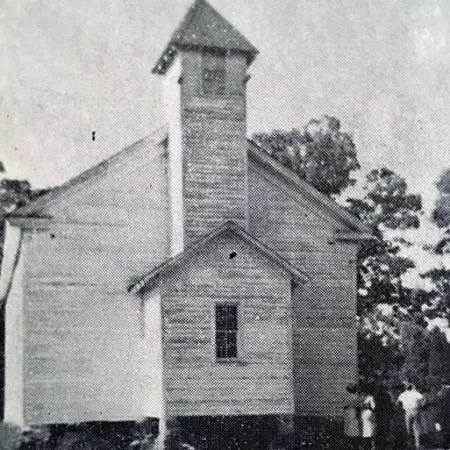
This community-engaged heritage preservation project centers on the historic Strieby Congregational Church, School, and Cemetery in Randolph County, NC—a state and federally recognized African American cultural heritage site founded in 1879. In partnership with the Strieby Board of Trustees, an interdisciplinary faculty team from UNCG will help document the cemetery, locate the schoolhouse foundation, collect oral histories, and construct an on-site interpretive exhibit. Building on extensive archival research by Strieby community members, the initiative integrates archaeological fieldwork, geophysical survey, and digital humanities. Undergraduate and graduate students will gain hands-on experience in cemetery documentation, oral history, excavation, and public interpretation. Deliverables include a geophysical survey, digitized oral histories, a 2D/3D gravestone archive, an interpretive exhibit, and a final report to the community. The project involves curricular integration, reciprocal partnerships, and alignment with faculty research agendas. The project also positions Strieby and UNCG to pursue external funding and connect with broader networks focused on Black heritage preservation. Ultimately, this collaboration will produce lasting preservation outcomes and foster durable academic-community infrastructures.
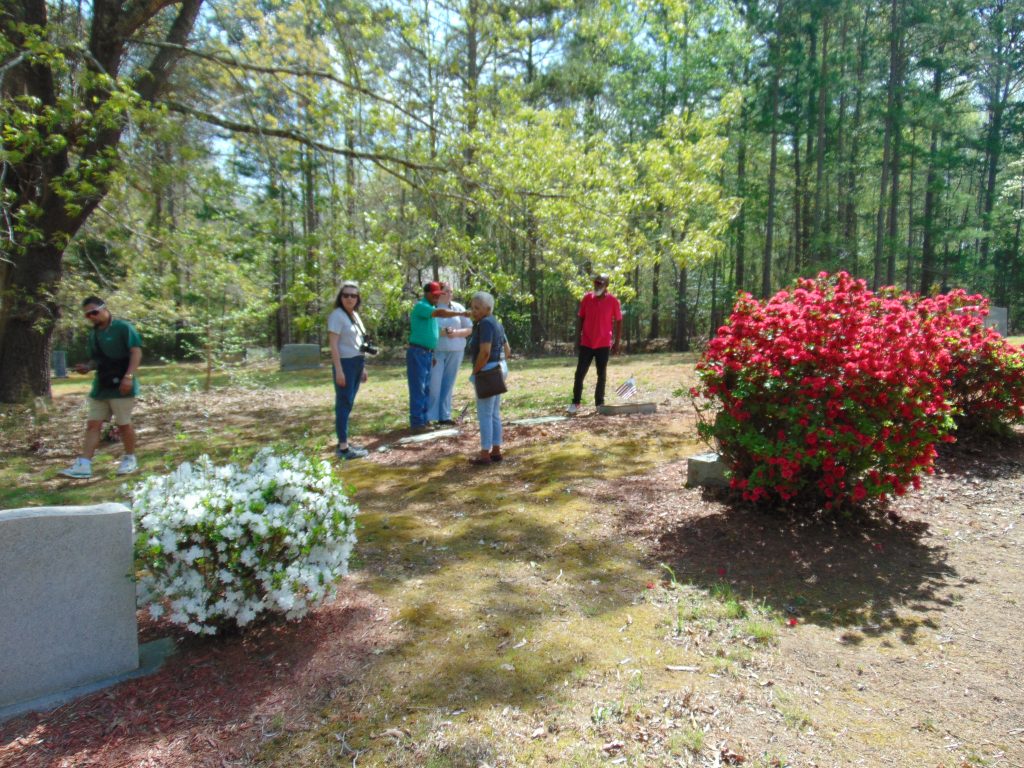
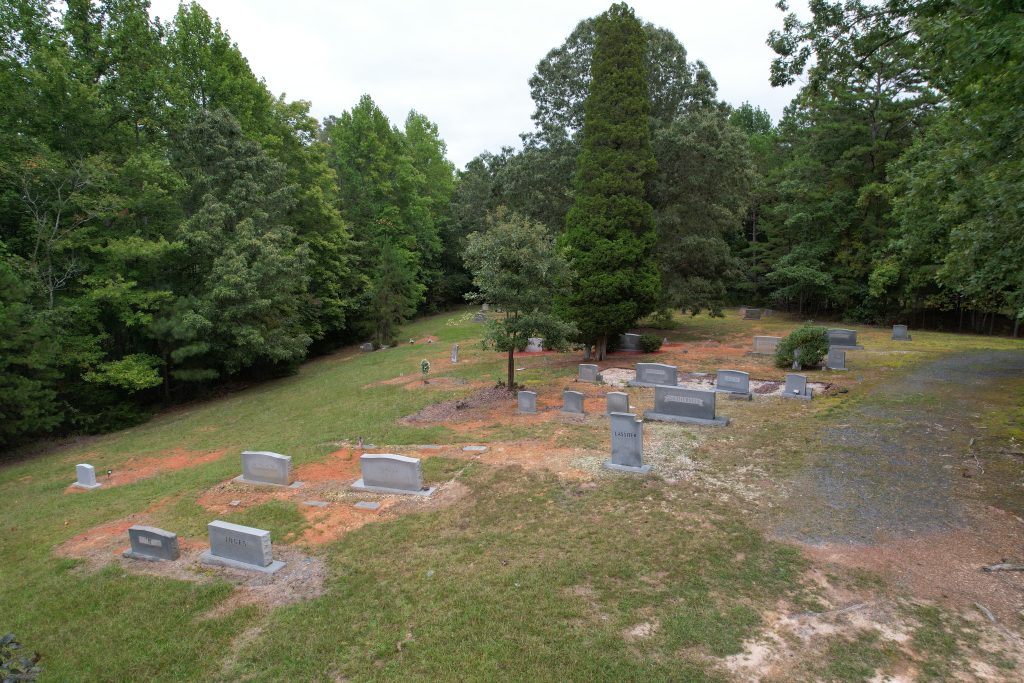
Team Members
- Tasha Laughlin Hall, President, Board of Trustees, Lifelong Community Member, Strieby Congregational Church
- Jerry Laughlin, Lifelong Community Member, Strieby Congregational Church
- Margo Lee Williams, Historian, Strieby Cultural Heritage Site
- Robyn Le Blanc, Assistant Professor, Ancient Mediterranean Studies & Archaeology, UNCG
- Cassandra Workman, Associate Professor, Anthropology, UNCG
- Dan Royall, Professor and Department Head, Geography, Environment, and Sustainability, UNCG
- Geoffrey Hughes, Lecturer, Anthropology, UNCG
- Charles Egeland, Professor of Anthropology and Director of Archaeology Program, UNCG
Activating Movement in Older Adults through Public Sculpture

Abstract
In 2023, an interdisciplinary team of researchers at UNCG on the intersection of arts and public health and our community collaborator, the Creative Aging Network, formed a partnership to create new models for intergenerational and multicultural public art around the United States. Through theoretical and applied, arts-based research, we are producing an interactive sculpture park in Greensboro, NC, that engages older adults to improve quality of life. The Creative Aging Network catalyzes communication between older adults through the arts. The nonprofit enhances the well-being and social connection among elders throughout North Carolina through artistic programming that is multicultural AND intergenerational. As a critical site for such action, collaborations and education, CAN-NC was awarded a 10-acre property donation in 2019 at 2400 Summit Avenue of wooded areas, streams, and fields. In 2023/24, the Creative Aging Network Public Art Initiative received Seed funding from the UNCG CVPA Dean’s Community Engagement Grant and in 2024 we received CB-URCA funding from the UNCG URSCO to support our work. Current arts-based research by our project team brings together faculty and undergraduate and graduate students in Sculpture, Interior Architecture, Kinesiology, Sociology, Gerontology, and Education. Our long-term goal is to create a public arts-based research space at UNCG focused on multigenerational experiences of outdoor art in the public interest.
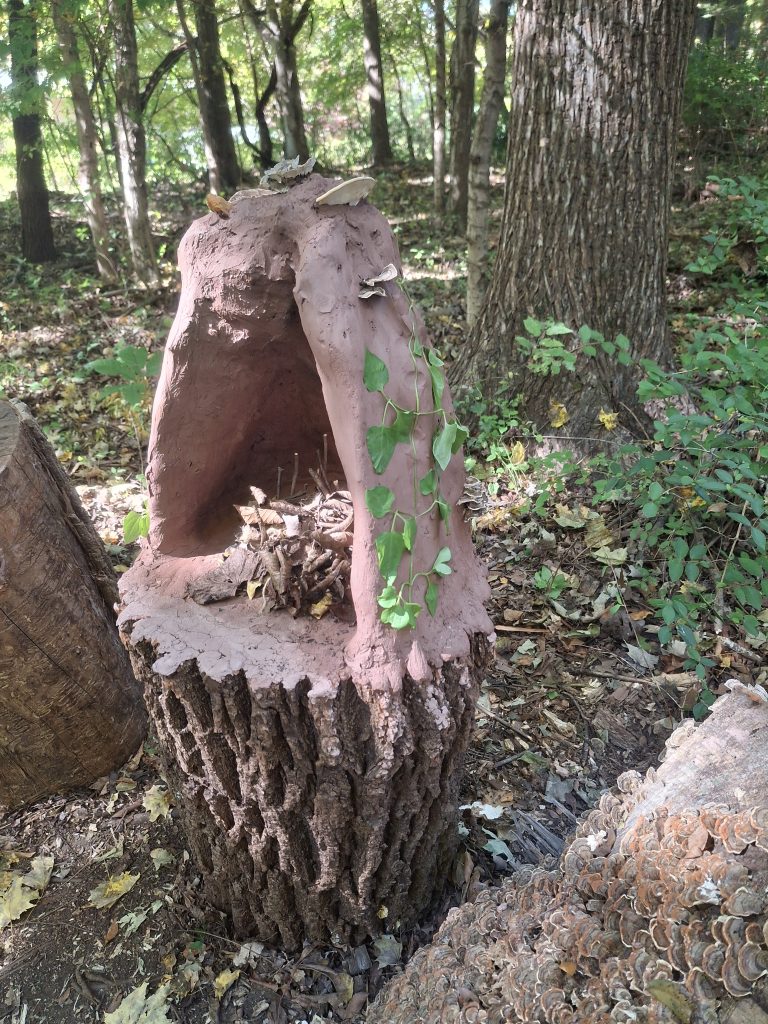
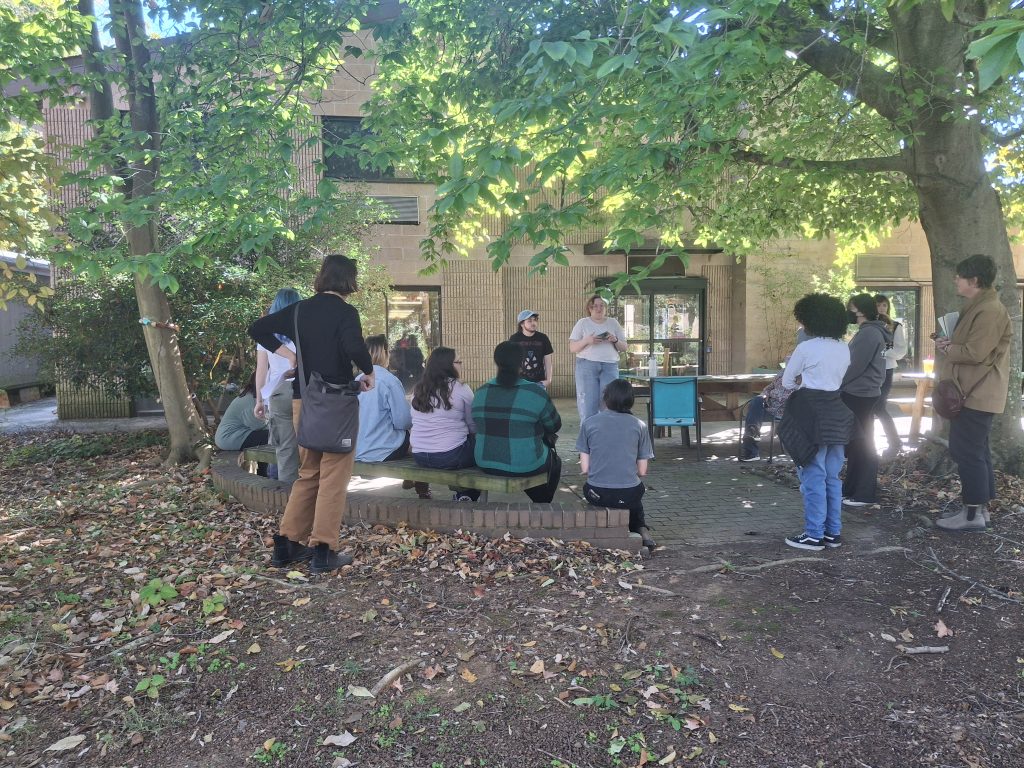
Team Members
- Barbara Campbell Thomas, Director, School of Art, UNCG
- Elise Eifert, Associate Professor, Graduate Gerontology Program Coordinator, Social Work, UNCG
- Kasia Ozga, Assistant Professor of Sculpture, UNCG
- Lia Miller, Co-founder and Executive Director, Creative Aging Network
- Sudha Shreeniwas, Professor, Human Development and Family Studies, UNCG
- Louisa Raisbeck, Associate Professor, Kinesiology, UNCG
- Derek Toomes, Interior Architecture, UNCG
- Patricia Wasserboehr, School of Art, UNCG

Sustainable Pathways to Community Wellness Through Entrepreneurship,
Innovation and Justice: Empower Innovate Sustain (EIS) Program
Abstract
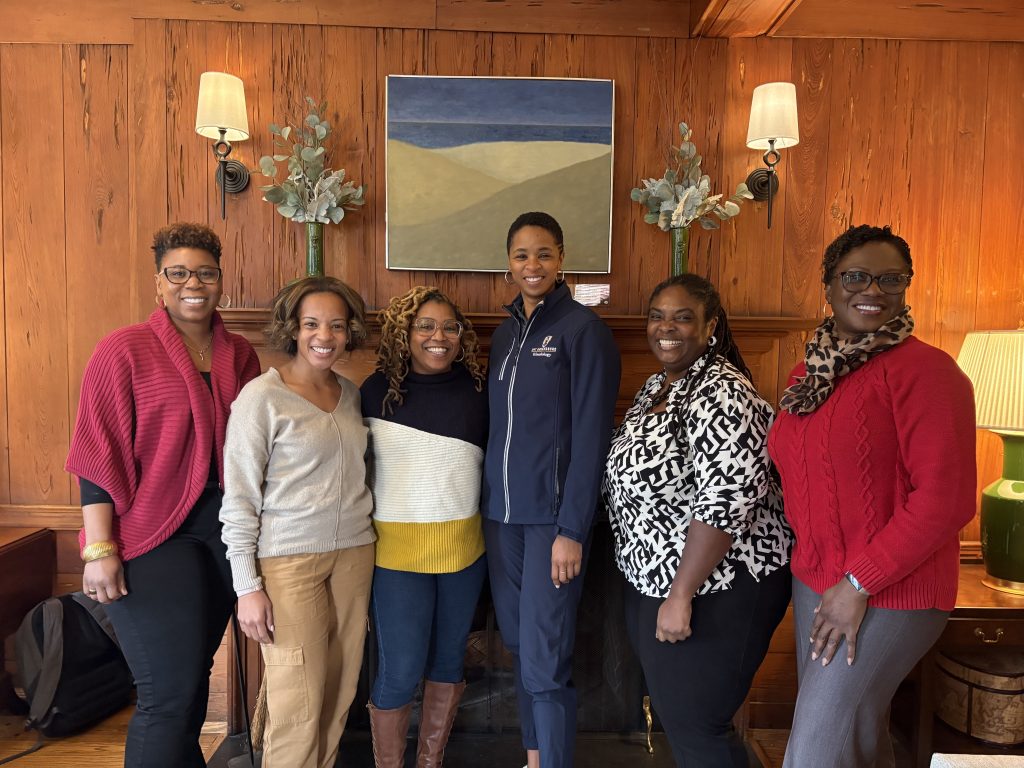
The EIS Initiative aims to leverage the expertise of three community partners and two UNCG faculty members to create a comprehensive training program for social entrepreneurs. This initiative will engage stakeholders to identify the needs of underserved communities, develop and test program elements, and refine a model training program. The goal is to equip social entrepreneurs with the necessary business acumen, resources, and community support to thrive financially while maintaining their social missions.
The core team, consisting of Taressa Burge, Sonya Staples, Amber Booker, Channelle James, and DeAnne Brooks, will collaboratively design the EIS program, recruit stakeholders, collect and analyze data, refine the program, facilitate workshops, and author curricula and publications. This collaborative effort will ensure the program meets the specific needs of social entrepreneurs and fosters a supportive community.
The project will focus on economic empowerment and business sustainability by creating a thriving economic ecosystem that supports innovation, entrepreneurship, and sustainable business practices. The EIS Initiative will assist social and sustainable entrepreneurs in integrating social value into their financial strategies, connecting with supportive markets, cultivating resources, and securing capital investment. Additionally, the program will offer students hands-on experience, fostering a deep connection to social value creation. Faculty involvement will expand research portfolios and ensure effective implementation of wellness solutions. By addressing the unique needs of social entrepreneurs, the EIS Initiative aims to drive positive change in the community and create pathways for future collaborations.


Team Members
- Channelle James, Lecturer, Marketing, Entrepreneurship, Hospitality & Tourism, UNCG
- Merlyn Griffiths, Associate Professor and Department Head, Marketing, Entrepreneurship, Hospitality & Tourism, UNCG
- Amber Booker, Owner, One Wellness Center
- Sonya Staples, Co-owner, Shades of Adventures
- Taressa Burge, Co-owner, Shades of Adventures
- DeAnne Brooks, Professional Track Associate Professor, Kinesiology, UNCG
Racial Reconciliation & the Design Studio
Project Title: Racial Reconciliation and the Design Studio: Creating Pathways and Partnerships between Design, Virtual Reality and Social Justice
Team Members: Asha Kutty, Regis Kopper, Deborah Barnes, Lucinda Havenhand, Travis Hicks
Offices/Organizations Represented: Interior Architecture and Computer Science departments at UNCG; the Guilford County Remembrance Project (GCRP) and the International Civil Rights Center and Museum (ICRCM).
Project Abstract: This project proposes a partnership among the interior architecture and computer science departments at UNCG, the Guilford County Remembrance Project (GCRP) and the International Civil Rights Center and Museum (ICRCM). Student designs for a museum and memorial to honor Eugene Hairston, Guilford County’s documented lynch victim, that were created in spring’22 with the support of an UNCG Ashby Dialogue grant, will be converted into Virtual Reality (VR) walkthroughs. These VR walkthroughs and designs will be showcased in the International Civil Rights Center and Museum, as part of an initiative by the Guilford County Remembrance Project (GCRP), to engage in knowledge generation and healing around the topics of lynching in the United States. Research across several disciplines has demonstrated that immersive media can increase empathy, which is a prerequisite to social justice and healing. In addition to experiential immersion, local high school students will be collaborating with UNCG student mentors from Dr. Kutty’s and Dr. Kopper’s departments for discussions and problem-solving. The GCRP strives to deploy these strategies in socially responsive ways to encourage students to take an informed and active role in shaping the communities in which they live.

Arts & Technology (ad)Venture
Partnership Title: Arts & Technology (ad)Venture
Team Members: Jennida Chase, Hassan Pitts, Muktha Jost, Amy Adamson, Jenny Braswell, Maria-Elena Surprenant, Lindsay Traumuller, Alev Flannagan, Caitlyn Schrader
Offices/Organizations Represented: John Motley Morehead Expressive Arts Magnet Elementary School (Morehead), the University of North Carolina at Greensboro’s (UNCG) Media Studies Department (MST), and the Department of Cartoon and Animation at Baskent University in Ankara, Turkey, as well as local independent artists.
Proposal Abstract: The Arts & Technology (ad)Venture, combines project-based collaboration with creative community building. This venture has two components. First, to design, support, and execute large scale collaborative projects that double as robust experiential learning opportunities. Second, to foster creative community by facilitating dialog and connection for artists and educators to offer support, and to encourage innovation by consistently inviting people into conversation. The venture will yield both high scholarly impact and direct community impact. This venture grows out of already existing partnerships and a history of previous collaborations. It seeks to continue to foster these relationships and build to include new ones.
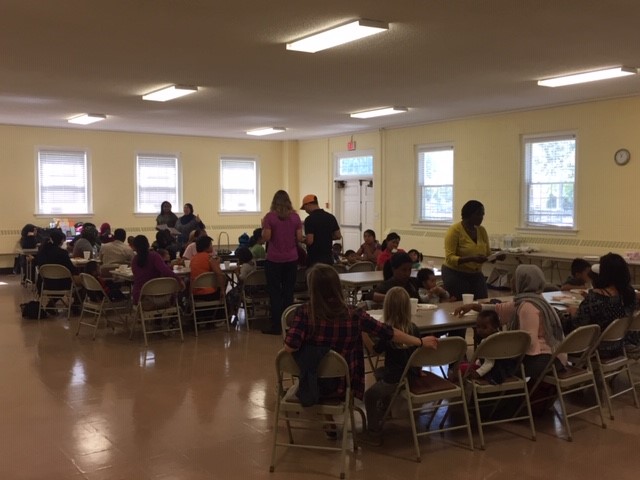
A Community Comes Together: Supporting Integration of Newly Arrived Congolese Refugees Through Empowerment and Facilitating Young Children’s Readiness for School
Abstract
This collaborative project will focus on Congolese refugee families and their young children in Guilford County. The P2 and advisory teams will aim to better understand disparities of access to early childhood educational services and English-learning opportunities among this population. It is hoped that this work will shed light on how Congolese refugee children have fared in learning before and during the pandemic, and how future success in preschoolers’ readiness for kindergarten maybe uncovered through dialogue and brainstorming. Discussions with the community may also lead to approaches for young children to attend preschool settings or engage in learning experiences within the home that naturally flow from culturally relevant practices and interactions, particularly in the areas of literacy. Furthermore, this work will investigate issues surrounding why the families rarely participate in opportunities that boost their English language skills. Dialogue with community partners and families may lead to opportunities and approaches that better match these needs.
Team Members:
- Joi Bulls
- Associate Dean for Undergraduate Affairs, Health and Human Sciences
- AP Associate Professor, Human Development and Family Studies, UNCG
- Rachel Boit
- Assistant Professor, Human Development and Family Studies, UNCG
- Claudine Mbangu
- Resident Cultural Broker, Greensboro
- Linda Hestenes
- Professor, Human Development and Family Studies, UNCG
- Dorothy Muhoro
- RN3 BSN PCCN Congregational Nurse, Cone Health & New Arrivals Institute
- Helene Mwadi
- Resident Cultural Broker, Greensboro
- Lynn Thompson
- Community Engagement Director, New Arrivals Institute

Reproductive Harm Reduction Toolkit
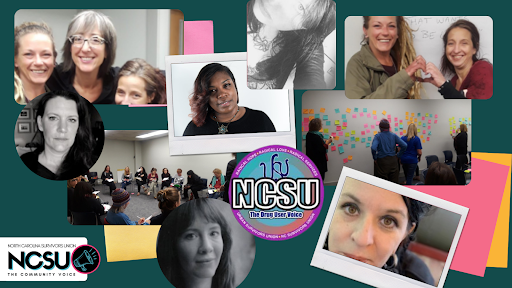
Abstract
This project extends and deepens an ongoing academic-community partnership focused on challenges experienced by people who use drugs (PWUD), especially within the realm of reproductive care. Our project focuses on stigma related to perinatal substance use and drug use among parents. Of special concern is that PWUDs experience stigma (individually, socially, and structurally) which can manifest in the threat of custody loss if they disclose their substance use and, subsequently, a person’s willingness to seek/receive care. Our project addresses such concerns through a community-partner/cross-disciplinary response that builds upon shared sites of expertise and perspective. We center community-partner lived experience narratives and build upon provisional work in drafting a training toolkit for providers that uses such narratives to address stigma. Our approach aims to critically supplement efforts in using narratives to cultivate empathy among individuals such as current/future providers; instead, we focus on bias and misinformation disruption to address the material–and pressing–effects of stigmatizing attitudes and behaviors.
The aims for this P2 initiative are to:
- Develop and refine a suite of training products and resources (toolkit) that combine lived experience narrative with evidence-based knowledge that is delivered using harm reduction and reproductive justice principles.
- Deliver tailored trainings and technical assistance to PWUDs and professionals who provide services to PWUDs and/or their children.
- Evaluate feasibility and effectiveness of training products at reducing stigma/implicit bias (self, social, and structural).
- Identify and address constraining aspects of interdisciplinary work across the humanities and health sciences, particularly as applied to community-engaged research and practice.
Team Members:
- Heather Adams
- Assistant Professor English, UNCG
- Tamika M. Davis
- Instructional Technology Consultant, School of Health and Human Sciences, UNCG
- Regina McCoy, MPH
- Professor of Public Health Education, UNCG
- Tracy Nichols, PhD
- Professor of Public Health Education, UNCG
- Abby Coulter
- Executive Assistant, Special Projects Coordinator, North Carolina Survivors Union
- Methadone Liaison, Urban Survivors Union
- Board Secretary, Women’s Harm Reduction International Network
- Louise Vincent, MPH
- Executive Director, North Carolina Survivors Union
- Leadership Team Member, Urban Survivors Union
- Dinah Adames (Otriz)
- Independent Consultant
- Harm Reduction Expert
- Expert on Mothers Who Use Drugs
- NCSU Board Member
- USU Leadership Team Member
- Tina Reynolds, MSW
- Consultant, North Carolina Survivors Union
- Caty Simon
- USU Leadership Team Member
- Editor, Narcofeminism Storyshare Project at North Carolina Survivors Union,
- Leadership Team Member at and Sex Worker Liaison for Urban Survivors Union, the national drug users union,
- Co-founder, Whose Corner Is It Anyway, Massachusetts organization by and for low-income sex workers who use drugs and/or experience housing insecurity.
- Ria Tsinas
- Director of Development, Academy of Perinatal Harm Reduction
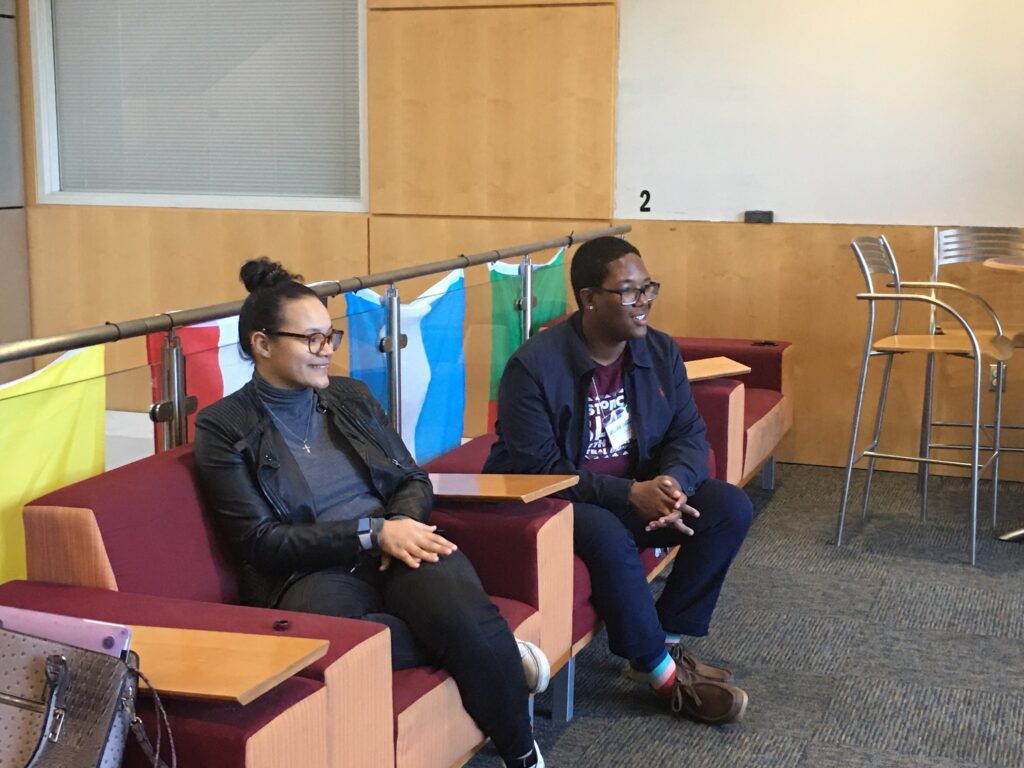
Crafting a Community-Engaged Approach: Creating Pathways for African Americans in Public History
Abstract
This project highlights and strengthens African American public history and preservation efforts throughout North Carolina. Museums, historic sites, cultural centers, libraries, and community groups across NC are working tirelessly to preserve and share the state’s rich African American heritage. Since 2017, the NC African American Heritage Commission, along with the UNCG graduate program in Museum Studies and the NCCU graduate program in Public History, have worked to create entry points and pathways for African American students to advance statewide African American heritage work as cultural heritage professionals. Through this project, our team will institutionalize our efforts to help African American students and emerging professionals enter and thrive in the cultural heritage field, and to support grassroots Black history projects. Ultimately, we will:
- Hold think tanks with Public History and Museums Studies students from across NC
- Hold skills-based trainings for practitioners and community groups leading Black history projects
- Develop a strategic plan and an expansive organizational structure for our pathways-building work
- Host a symposium centered on this work, and aligning work across the state and region
Team Members
- Torren Gatson, Assistant Professor, Department of History, UNCG
- Anne Parsons, Director of Public History, Associate Professor, Department of History, UNCG
- Omar Ali, Dean, International Lloyd Honors College, Professor, African American and African Diaspora Studies and History, UNCG
- Angela Thorpe, Director, North Carolina African American Heritage Commission
- Charles Johnson, Director of Public History, Assistant Professor, Department of History, NCCU
- Adrienne Nirde, Associate Director, North Carolina African American Heritage Commission
Public Artifacts

Community Placemaking Action Lab
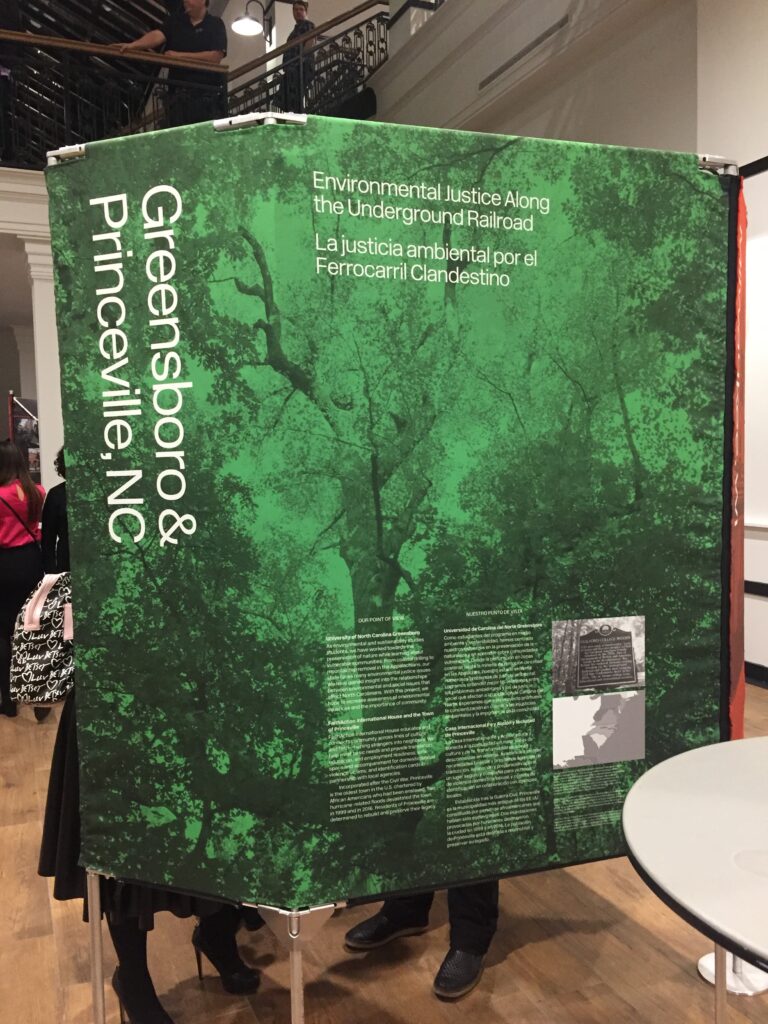
Abstract
This Community-Engaged Pathways and Partnerships (P2) project brings together representatives from Princeville and Greensboro, North Carolina in order to critically examine issues at the intersection of race, gender, migration, and climate and environmental justice. Legislative theatre will serve as one of our primary processes of community-engaged research, which will further result in policy recommendations to address related issues in these and other NC communities. Legislative theatre is a democratic form of action research in which all community members, regardless of age or ability, can participate in surfacing and defining pressing community needs, and then crafting policy responses. These ongoing research activities further serve to maintain institutional energy within UNCG around our Humanities Action Lab exhibit, “Environmental Justice Along the Underground Railroad”, which will return to Greensboro for public display in 2023, after touring 24 cities for more than three years.
Team Members
- Marcia Hale, Assistant Professor, Department of Peace and Conflict Studies, UNCG
- Lalenja Harrington, Lecturer, Department of Educational Leadership and Cultural Foundations
- Jennifer Feather, Associate Professor, Department of English, UNCG
- Glenda Knight, Town Manager, Town of Princeville
- Linda Joyner, Town Commisioner
- Esther Leerkes, Office of Research, UNCG
- Alicia “LeeCee” Jones, Social Justice Advocate and Community Liasion
- Kelsi Dew, Historical Outreach Coordinator
- Phun H, Education and Advocacy Coordinator, FaithAction International House
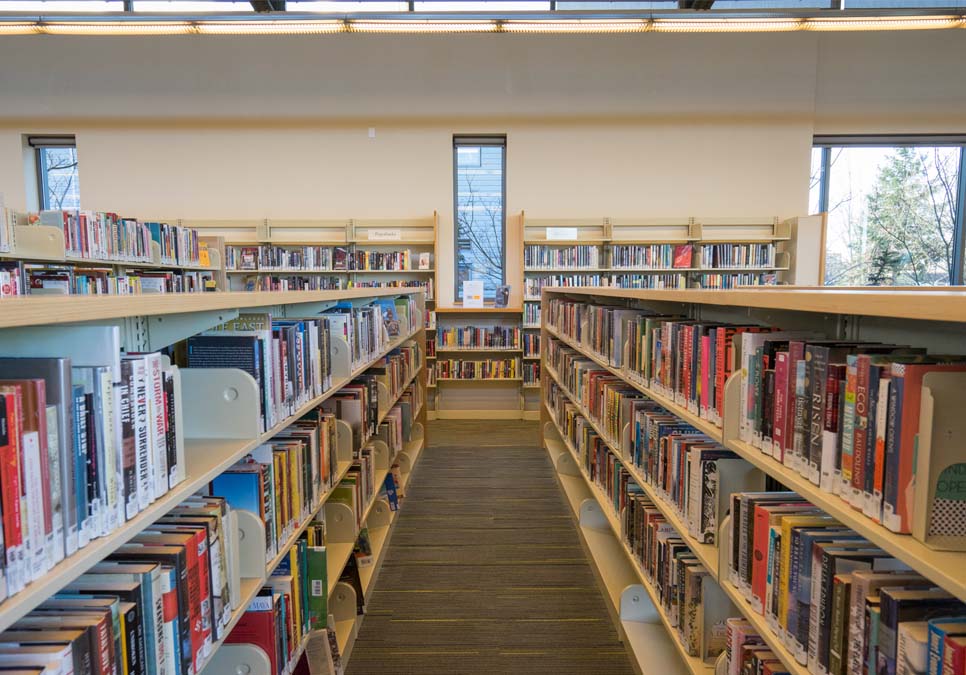
Social Work and Social Workers in the Public Library
Abstract
This Community-Engaged Pathways and Partnerships (P2) project brings together representatives from across Guilford County to deepen integration among public librarianship, social work, the Joint Master of Social Work (JMSW), and the Master’s of Library and Information Science (MLIS) programs. This project seeks to deepen and extend this existing cross-institutional partnership such that:
- Vital social services remain perpetually accessible within local public libraries; and
- The experiences of the JMSW candidates placed in public libraries directly informs cross-institutional collaboration and the curricula of the JMSW and MLIS programs
Team Members
- Brigitte Blanton, Director, Greensboro Public Library
- Melissa Floyd-Pickard, Professor, Chair, Social Work, UNCG
- Alicia Kaplan, Co-Field Director, Joint Master of Social Work Program, UNCG
- Maruka Rivers, Lecturer, Co-Field Director, Joint Master of Social Work Program, NC A&T University
- Noah Lenstra, Assistant Professor, Library Information Sciences, UNCG
- Lorrie Russel, Assistant Director, High Point Public Library
- Mary Sizemore, Director, High Point Public Library
- Michelle M. Vance, Assistant Professor, Joint Master of Social Work Program, NC A&T University

Industries of the Blind and School of Art Public Art Project
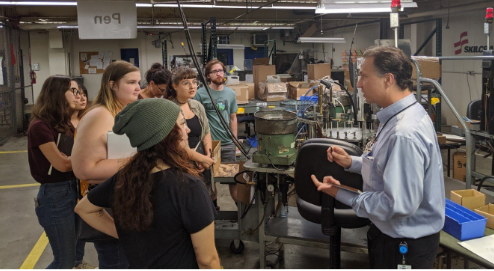
Abstract
The School of Art with support from the College of Visual and Performing Arts’ Community Arts Collaborative is embarking on an innovative project that pairs employees of Industries of the Blind (IOB) with students from the School of Art’s Painting/Drawing, Art History, and Sculpture Departments to create a highly visible public art piece on Gate City Boulevard to be experienced through sight, sound, and touch. IOB was founded in 1913 and is located on the corner of Gate City Boulevard. and Tate Street. Industries of the Blind currently employs 300 people, 70% of which are visually impaired.
Annually for the next three years, between 6 – 10 Painting III students in Mariam Stephan’s class will each be paired with a visually impaired employee at IOB to create paintings based on their conversations addressing ideas of independence, empowerment, and access. Each painting will then be printed on large 8 foot x 10 foot banners and installed on the exterior of the IOB building. Dr. Nicole Scalissi and her Art History students will record descriptive and contextual narratives to coincide with the banners to be housed in sound boxes installed underneath each banner. Passerbys and IOB employees can hear these narratives by pressing a button on the sound box.
Art History students will work with UNCG’s Digital Media Commons to edit these recordings to be engaging to a general and vision-diverse public. The audio material, as well as a transcript, will be publicly available both online (through a website hosted by UNCG’s library) and on Gate City Blvd to pedestrians of diverse vision abilities. Meanwhile, Professor Dane Winker’s Sculpture students will be creating bas-relief bronze sculptures as a three dimensional representation of the images created by the Painting III students using traditional casting methods and a more contemporary approach to form making utilizing a 3D modeling computer program. The relief sculptures will be placed beside the audio boxes so that the visually impaired will be able to experience the images through touch. This project will continue each year for at-least three years, with a new group of IOB employees and School of Art students creating new banners, relief sculptures, and corresponding audio tracks.
Team Members
- Chris Cassidy, Director, School of Art, UNCG
- Leah Sobsey, Associate Professor, Art-Photography, UNCG
- Richard Oliver, Director of Community Outreach and Governmental Relations, Industries of the Blind
- Maggie Murphy, Assistant Professor, First-Year Writing, Visual Art, and Humanities Librarian, UNCG
- Pat Wasserboehr, Professor, Art-Sculpture, UNCG
- Caitlyn Schrader, Director of GPS CVPA Community Engagement, UNCG
- Derek Toomes, Assistant Professor, Interior Architecture, UNCG
- (Year 1-2 member)Nicole Scalissi, Assistant Professor, Contemporary Art History, UNCG
- (Year 1-2 member)Mariam Stephan, Associate Professor, Painting/Drawing, UNCG
- (Year 1-2 member) Dane Winkler, Assistant Professor, Art-Sculpture, UNCG
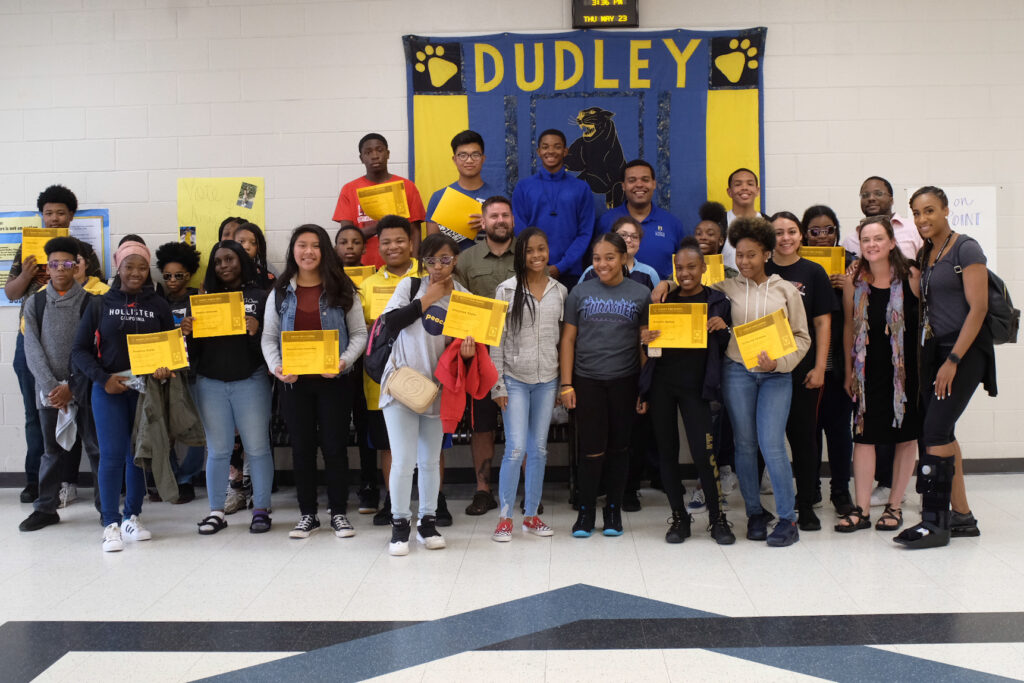
Restorative Practices Health and Physical Education Partnership
Abstract
Early in our collaborative process, our community partners identified “peaceful conflict resolution” as a need for all students at Dudley. Teachers and administrators at Dudley noted students inability to resolve conflicts as a root cause of the issues leading to behavioral referrals and school suspension. The school has several measures in place to help students navigate conflicts once they occur, but did not have proactive measures to teach all students peaceful conflict resolution skills. This preventative approach to conflict provides many advantages to positively affecting the school climate and building on best practices of community engaged research and praxis of conflict transformation. Furthermore, our partners identified 9th grade health and physical education as the most beneficial place for such curricular intervention. Besides the state requirement that all 9th grade students pass physical education and health, the North Carolina Essential Standards for Curriculum emphasizes teaching conflict resolution in both subject areas. This proposal aims to address the community identified approach by building on the strengths of Dudley and UNCG as equal partners in establishing a conflict competencies among Dudley students.
Public Artifacts
Team Members
- Pam Brown, AP Professor, Kinesiology, Director, Doctor of Education in Kinesiology Online, UNCG
- Cheryl Donahue-Wright, Site Director, Dudley High School, Communities in Schools
- Omari Dyson, AP Assistant Professor, Peace and Conflict Studies, UNCG
- Rinda Estes, Assistant Director & Programs Operations, Communities in Schools
- Michael A. Hemphill, Assistant Professor, Kinesiology, UNCG
- Yongsun Lee, Doctoral Student, Kinesiology, UNCG
- Darlene Mitchell, Physical Education, Dudley High School
- Meagan Patillo, Director of Clinical Services and Health Education, Triad Health Project
- Sarah Ragab, Undergraduate Student, Kinesiology, UNCG
- Amy Reese, Director of High Point Services, Triad Health Project
- Jeremy Rinker, Assistant Professor, Peace and Conflict Studies, UNCG
- Melvinia Robinson, Chair, Physical Education and Health, Dudley High School
- Jimmi Williams, Executive Director, Communities in Schools

A Marketing and Tourism Partnership with the Triad Brewing Industry
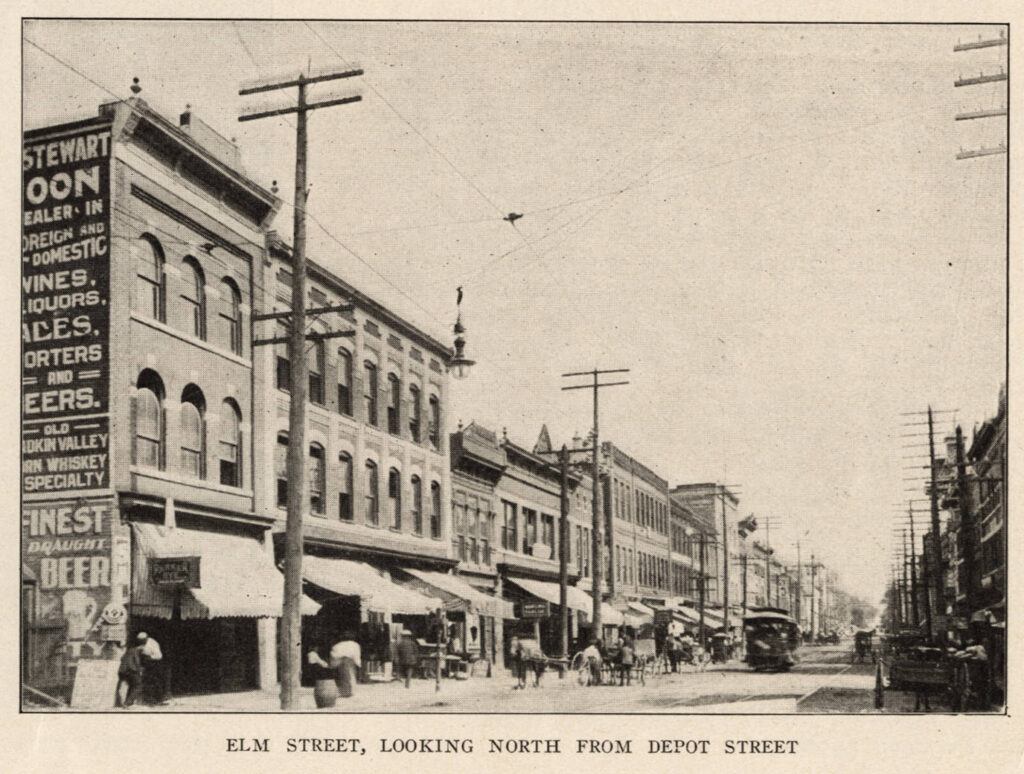
Abstract
The craft brewery industry in North Carolina has an annual economic impact of $2.18 billion and provides over 12,000 jobs. Breweries often serve as a catalyst for revitalization and community development, but they are also small businesses operated by individual entrepreneurs. Collaboration within the industry is common, but collaboration on regional tourism marketing is not. Well Crafted NC began in Fall 2017 and now contains oral history interviews and archival records from over 23 North Carolina breweries. The Well Crafted NC team has collaborated with the North Carolina Craft Brewers Guild on developing educational outreach activities for their members and for the general public. A partnership with North Carolina chapters of the Pink Boots Society, an organization dedicated to providing education and training for women in the beer industry, led to a series of oral history interviews with women brewers and brewery owners as well as an exhibit at the group’s annual Biere de Femme beer festival. Over the past 12 years the Bryan School of Business and Economics has been researching and working with the craft beverage industry (wine, beer, spirits), primarily assisting the wine industry with business related research and projects. To date the Bryan School has completed 19 projects for the NC wine and grape industry including; marketing plans, strategic plans, and tourism visitor studies.
With this project, the team brings these two initiatives together with the professional expertise of the Triad Brewers Alliance and its members in order to preserve their history, develop their stories, and build a regional marketing plan promoting the Triad as a craft beer destination based on those stories. This will result in a partnership that will successfully build a shared history for Triad beer and use that shared history to promote a distinct identity. This distinct identity will provide the TBA with a roadmap for reaching its stated goal of promoting the Triad as a destination location for craft beer tourists.
Public Artifacts
Well Crafted NC
Team Members
- Stuart Barnhart, President, Triad Brewers Alliance, Owner, Fiddlin’ Fish
- Tim Bucknall, Associate Professor, Assistant Dean, Electronic Resources and
Information Technology in the University Libraries, UNCG - Erick Byrd, Associate Professor, Department of Marketing, Entrepreneurship, Hospitality, and Tourism, UNCG
- Richard Cox, Digital Technology Consultant, University Libraries, UNCG
- David Gwynn, Associate Professor, Digital Projects Coordinator, University Libraries, UNCG
- Erin Lawrimore, Associate Professor, University Archivist, University Libraries, UNCG
- Joel McClosky, President, Triad Brewers Alliance
- John R. Szymankiewicz, Attorney, The Beer Law Center in Raleigh, Associate member, TBA
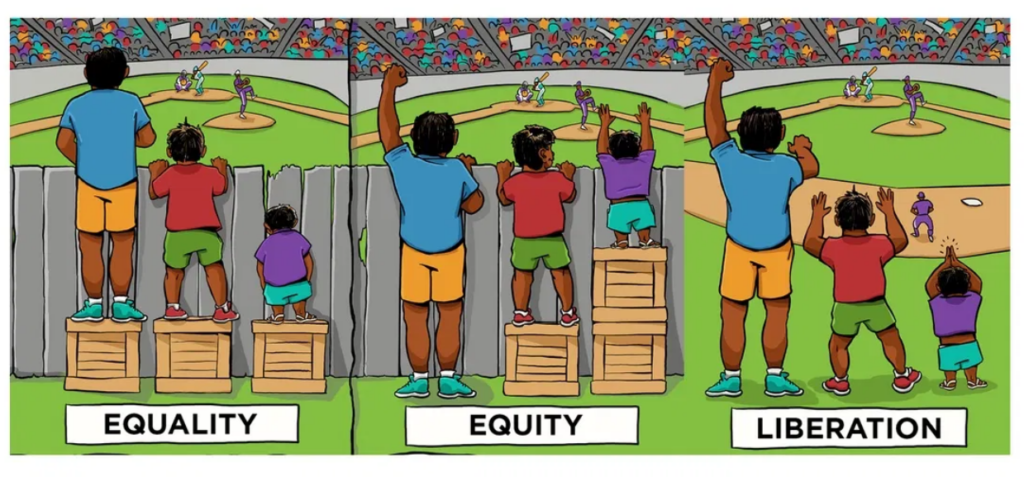
Strengthening Community-Engaged Education and Research in Health Equity
Abstract
Due to the increasing complexity of 21st century challenges, there is an increased demand for collaborations that span boundaries of disciplines and sectors. Issues such as racial health equity will not be solved thought siloed work in community agencies or a single researcher’s work. The Community-Engaged Pathways and Partnerships (P2) grant program supports community-engaged scholarship that moves individual work to collective action.
The purpose of this conversation is to increase knowledge about community engagement work that enhances collective action among university-community partnerships and what is needed to support this work, which will be met by discussing the development, implementation, and evaluation of community-engaged grant programs. Participants will learn about the structure and purpose of the P2 grant program as well as lessons learned from its first cohort. While the practice and the literature on engaged departments has been increasing, there is little in theory or practice about engaging across units. Therefore, to better understand the impact of this grant program there is an evaluation component included to help us better design, implement, and modify our program. Presenters will share about the evaluation process as well as initial findings.
Through a 10-minute introduction, we will provide a basic description of the program and the roles of the presenters. Then we will facilitate conversation among the P2 grant administrators, participants, and evaluators and the audience.
Public Artifacts
HHS 376 Power Analysis Final Assignment Description
HHS 376 Required Readings and Videos
Successes Challenges summary HHS 376 05.24.2021 FINAL
Team Presentation at P2 Fall 2019 Kickoff Meeting
Team Members
- Phyllis Carter, Executive Director, The Partnership Project
- Crystal Dixon, Assistant Professor, Public Health Education, UNCG
- Kari Thatcher, Chair, The Partnership Project
- Jennifer Toller Erausquin, Assistant Professor, Public Health Education, UNCG
- Kathleen Williams, Senior Associate Dean, School of Health and Human Sciences, UNCG
- Christina Yongue, Assistant Professor, Public Health Education, UNCG

Eviction Resolution
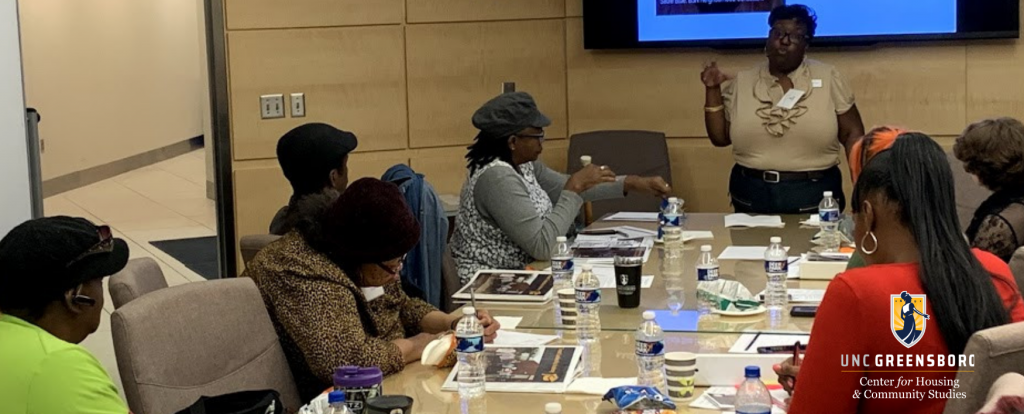
Abstract
The goal of our collaborative of academic departments, research centers, the NC District Courts, the Guilford County Government, the Greensboro Housing Coalition, community activists, landlord, local foundations, and other institutions is to reduce the displacement of families from their homes through eviction. Evictions lead to increase financial burdens for both landlords and tenants and often homelessness of displaced occupants. The programs that will be developed will identify and seek a mutually beneficial resolution to allow occupants to remain in their homes. The benefits of the program will be examined by conducting Return on Investment and Cost Saving analyses.
Public Artifacts
Greensboro’s Eviction Crisis Report
Greensboro Eviction Rates Are Among the Highest in the Country
A Closer Look at Evictions Infographic
Team Members
- Jeremy Bray, Professor of Economics and Head of Department, Economics, UNCG
- Brett Byerly, Executive Director, Greensboro Housing Coalition
- Kenneth Gruber, Evaluation Section Chair, Center for Youth and Family and Community Partnerships, UNCG
- Somya Mohanti, Assistant Professor, Computer Science, UNCG
- Bruce Rich, Graduate Researcher, Center for Housing and Community Studies, UNCG
- Stephen Sills, Director, Center for Housing and Community Studies, Associate Professor, Sociology, UNCG
Professional Development Opportunities for P2 Recipients
Partnerships and Pathways participants receive professional development opportunities tailored to their needs and interests. Many of these opportunities are also open to the campus and community. See something here that interests you? Let us know how we can continue the conversation with a quick email to communityengagement@uncg.edu!
Ripple Effects Mapping
Ripple Effects Mapping (REM) is a narrative-based assessment tool that can show broader impacts and untold stories of community-engaged work. REM is specifically designed to serve community partnerships because it helps us remember and share our work on these projects as they’ve expanded and shifted in our communities. ICEE staff are trained REM facilitators. REM sessions can be face-to-face or virtual, require a 90-minute time block, (groups larger than 8 may take more time) and generate rich narrative artifacts for participants to use in reporting and promotional items.
Grants Prospecting With Hanover Research Group
In September, 2024, ICEE hosted a workshop on grant prospecting, facilitated by consultants from Hanover Research Group and Joy Dismukes, UNCG’s Director of Sponsored Programs. UNCG and community partners can access the video and transcript.

